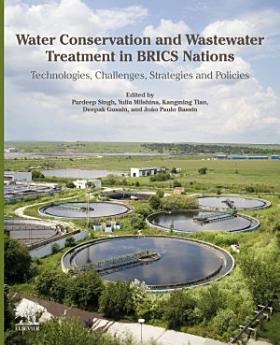Water Conservation and Wastewater Treatment in BRICS Nations: Technologies, Challenges, Strategies and Policies
About this ebook
About the author
Pardeep Singh is Professor and Head at the School of Advanced Chemical Sciences, Shoolini University, Solan, India. He is specialized in physical chemistry and heads a lab of research scholars who work on photocatalysis with the aim of generating new knowledge on graphene-based photocatalytic materials and processes to develop novel de-pollution treatments with enhanced efficiency and pilot-scale applicability. He is also exploring the generation of bio-waste material-based activated carbon for adsorption-based removal of aqueous phase pollutants.
Dr. Milshina is currently working as a Leading expert at National Research University Higher School of Economics in Institute for Statistical Studies and Economics of Knowledge, Moscow, Russia. She has obtained her master degree in economics at Lomonosov Moscow State University, 2013. Her PhD thesis is about Mechanisms for managing public-private partnership projects in conditions of financial and economic instability. She has 10 years of work and research experience in the field of STI and foresight: from business consulting of innovative companies and startups to managing global technology trend monitoring project on University’s level (https://issek.hse.ru/trendletter/). She has published more than 10 research papers (2 of them in Q1 and Q2). Her present research fields are global technology trend monitoring and ecological and climate trends research (including water management and pollution). She is also currently working on Russia Foresight 2030, Moscow innovative project.
Dr Tain is currently working as a Lecturer, Dept. Biological Chemical Engineering, and Tianjin University of Science & Technology, Tianjin, and P. R. China. He has obtained his BS in Biotechnology, Yantai University, Yantai, P. R. China in 2006. His PhD thesis is about Conversion of glycerol to lactic acid with metabolically engineered Escherichia coli. He has 13 years of work and research experience in the field of Biotechnology. He has published about 20 nation and international publication in the areas of Biotechnology, Industrial synthesis process and wastewater treatment technology. He has also four innovation patents. He is also the member of various academic societies.
Dr. Deepak Gusain is a post-doctoral fellow at the Institute for Water and Wastewater Technology, Durban University of Technology, researching new materials for remediation of inorganic contaminants. His B.Sc. General Gr(B) with Botany, Zoology and Chemistry as core subjects is from Deen Dayal Upadhyaya College, University of Delhi. He also holds an M.Sc. in Environmental Studies from the School of Environmental Studies (now the Department of Environmental Studies) at the University of Delhi and a Ph.D. from the Department of Chemistry of the Indian Institute of Technology (BHU), Varanasi. His Ph.D. research focused on the remediation of chromium and cadmium from aqueous solution using nano-crystalline material. In addition to this, he investigated the effect of linear and non-linear curve fitting on estimation of isotherm, kinetic and thermodynamic parameters.
Dr. João Paulo Bassin is currently working as Adjunct Professor at the Federal University of Rio de Janeiro. He obtained his master degree in Chemical Engineering from the Federal University of Rio de Janeiro, Brazil (2008), and a PhD degree in Environmental Engineering Technology/Environmental Biotechnology from Delft University of Technology, The Netherlands (2012). His research is mainly focused on the development and application of innovative technologies for the treatment of municipal and industrial wastewaters, combining biological, physicochemical and advanced oxidation processes. He is also interested in energy recovery from organic wastes via anaerobic digestion. He has published many articles in international peer-reviewed journals, books and book chapters and has served as a reviewer for more than 50 international journals.




